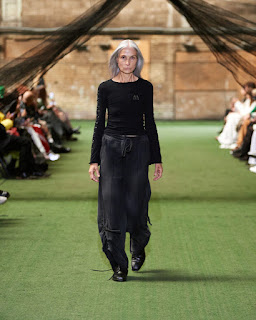by Oana-Maria Moldovan
Copenhagen Fashion Week (CPHFW), once a hidden gem on the global fashion calendar, is rapidly emerging as a new epicentre of style, diversity, and innovation.
In an industry notorious for its stringent standards of beauty and body size, Copenhagen's ascent as a fashion capital is underlined by its unwavering commitment to inclusivity.
The recent SS24 season witnessed a significant increase in body representation, setting a precedent for the world of fashion, compared to other Fashion Week cities that have been around in this industry for far longer, like Paris.
As per a recent Vogue Business article, the fashion industry at large has been grappling with a decline in mid-size and plus-size models on the runways of New York, London, Milan, and Paris.
The study revealed a staggering statistic: a mere 0.6% of models in these major fashion weeks were categorized as curvy (size 42+), while only 3.8% fell under the medium-sized (size 38-40) category. This meant that an overwhelming 95.6% of looks were worn by models classified as confection size S (36) or smaller.
However, against this disheartening backdrop, Copenhagen Fashion Week has emerged as a beacon of change. According to one Danish online fashion news platform, named Fashion Forum, Copenhagen Fashion Week's SS24 edition demonstrated a remarkable increase in body diversity.
The number of curvy models jumped from 2.9% in the SS23 season to an impressive 7.39% in SS24. Even more noteworthy was the increase in mid-sized models, a size that resonates with the majority of women in Denmark.
This size category saw a surge from just six looks out of 806 in SS23 to 33 looks out of 785 in SS24, indicating a steady upward trend.
The rise of Copenhagen Fashion Week as one of the few cities known for setting the trends can be attributed to this clear focus on inclusivity.
In recent years we have seen the major contribution that the younger generation is making to the way we view the human body and clothing size and how it can affect our daily lives and health.
Or, rather, in an industry that will soon be dominated by a new generation of fashion enthusiasts wanting to make this world a safer place, CPHFW is increasingly becoming what we need right now.
Cecilie Thorsmark, CEO of Copenhagen Fashion Week, emphasizes the industry's changing landscape. She notes that in recent years, the Danish and Scandinavian fashion industry has set itself apart by championing sustainability and diversity.
Copenhagen Fashion Week's emphasis on inclusivity not only aligns with the demands of the modern fashion consumer but also sets a positive example for the rest of the industry, using fashion as a means to a social statement: all bodies are meant to be on the runways.
The rise in body diversity in a newer Fashion Week city signifies a turning point for an industry known for perpetuating unattainable beauty standards.
Simply put, the old heroin chic style from the 90s will soon be out - and let's hope for good this time - , and a new more inclusive way of viewing fashion and human bodies will take the stage.
As other major Fashion Weeks face criticism for their lack of diversity, CPHFW's success story showcases the potential for change. More people want to see others that look like them on the runways than not.
The space that Copenhagen creates within its Fashion Week has become a place where fashion goes hand in hand with social responsibility, and its increasing popularity is evidence that this approach resonates with both industry insiders and the fashion-savvy public.
In the grand narrative of fashion, Copenhagen is emerging as a city that celebrates beauty in all its forms, and its commitment to inclusivity is a beacon of hope for an industry in need of change.
As we move forward, we can expect Copenhagen Fashion Week to continue its upward trajectory, making its mark not only in the world of style but also as a champion of diversity and representation, setting an example that other fashion capitals would do well to follow.
This is what consumers have been asking for the last five years, and CPHFW is the one to give it to them.
Edited by Emily Duff



